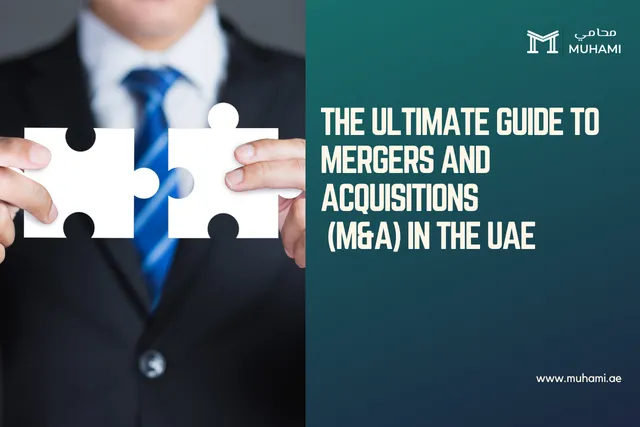The Entrepreneur’s Guide to Structuring Successful Mergers and Acquisitions in the UAE (Part 1)

The startup ecosystem in the United Arab Emirates (UAE) is evolving and expanding. Therefore, Mergers and Acquisitions (M&A) are becoming an increasingly relevant strategy for startups and entrepreneurs in the UAE.
As the UAE solidifies its status as a global innovation hub, Mergers and Acquisitions are poised to play an increasingly pivotal role in its thriving startup ecosystem. Startups and entrepreneurs should stay abreast of the rapidly evolving M&A landscape and view it as a strategic avenue for growth, expansion, and liquidity.
Strategic M&A helps grow business, broaden market presence, and facilitate lucrative exits. By partnering with other companies, businesses can tap into new markets and gain access to valuable resources.
Businesses can also improve their competitive edge by acquiring new technologies and customer base. M&A offers an attractive exit strategy for financial buyers who aim to optimize their investment returns by targeting companies with significant growth prospects.
What is Mergers and Acquisitions (M&A)?
Mergers and acquisitions are corporate strategies that focus on the consolidation of companies or their assets. Although the terms are frequently used interchangeably, they refer to separate processes with different implications for the entities involved.
A merger takes place when two companies join forces to create a new organization. During this process, both companies legally dissolve their former identities and establish a new entity, usually under a different name.
An acquisition, in contrast, refers to one company buying a controlling stake in another. In this scenario, the acquiring company assumes control over the target company's operations, which may no longer operate as an independent entity.
The primary goals of M&A include:
- increasing market share;
- entering new markets;
- enhancing operational efficiencies.
The merged entity can expand its market presence and customer base, leading to increased revenues and profitability. Mergers can lead to cost savings through shared resources.
Preparing Your Startup for Mergers and Acquisitions
Financial Health and Valuation
Financial health and valuation are crucial elements of successful M&A. Accurate financial records provide a transparent view of a company's financial health and facilitate informed decision-making. Valuation is a vital process that provides the necessary data for evaluating a company's worth. It enables businesses to make well-informed decisions and negotiate effectively.
Legal Readiness
Thorough documentation in M&A is essential for reducing risks, ensuring compliance with regulations, and fostering trust. Together, these elements play an integral role in the success of M&A transactions by promoting clarity and efficiency throughout each phase of the deal.
Structuring the Deal: Key Components
Deal Structures
An M&A transaction can take two forms: Asset Purchase and Share Purchase.
In an asset purchase, the acquiring company buys specific assets of the target company (such as inventory, equipment, real estate) whereas share purchase involves acquisition of the shares of the target company. The main difference between the two is that in case of asset purchase, there is no transfer of ownership and in case of share purchase, the buyer acquires the ownership of the target company.
Pros and Cons
In an asset purchase, buyers can avoid unwanted liabilities, whereas, in a share purchase, they take on all liabilities linked to the target company.
Asset purchases often involve more intricate negotiations and documentation since each asset must be identified and transferred individually. A share purchase is typically more straightforward because it does not involve the transfer of individual assets.
Managing Due Diligence
Due Diligence is an essential process that can determine the success or failure of an M&A deal. It enables businesses to identify potential risks associated with the target company as well as legal, financial, and regulatory challenges. Deals that are supported by comprehensive due diligence are more likely to succeed.
Due Diligence includes a comprehensive evaluation of the target company's financial health, its contractual obligations, operational efficiency, tax implications, etc. It is important to thoroughly review the target company’s financial statements, constitutional documents, employment documents, licenses and lease agreements, financial facilities taken by the target company, etc.
Post-Merger Integration: Ensuring a Smooth Transition
Once the acquisition or merger is complete, the next step is to prepare integration plans. To make the transition as smooth as possible for all stakeholders, ensure that the combined business is aligned and compliant with all applicable local laws and regulations. This involves liaising with the client for any required NOCs, reviewing relevant amendments to the constitutional documents, reviewing the assignment of the lease agreement, etc.
Conclusion
M&A transactions are highly complex. M&A advisors play a crucial role in the success of mergers and acquisitions by providing specialized expertise and strategic guidance throughout the transaction process.
M&A advisors have extensive expertise in valuation techniques and due diligence procedures, both of which are crucial for accurately evaluating a company's value and identifying potential risks. They can also help in facilitating negotiations between the parties as well as developing integration strategies to facilitate a seamless transition.
This article is the first one in a series of articles on M&A Transactions. The following articles shall form part of this series:
- Non-Binding MOU or Term Sheet
- Due Diligence
- Sale & Purchase Agreement
- Completion
Any Questions?
Connect with lawyers and seek expert legal advice
Share
Find by Article Category
Browse articles by categories
Find Article by Practice Area
Browse articles by practice area
Related Articles

The Ultimate Guide to Mergers and Acqui…
The UAE is an exclusive destination for Mergers and Acquisitions (M&A)…

The Ultimate Guide to Mergers and Acquisitions (M…
The UAE is an exclusive destination for Merg…

Selling a UAE-Based Company to the U.S.…
Selling a UAE business to the US Corporation is a cross-border mergers and…

Selling a UAE-Based Company to the U.S. Corporati…
Selling a UAE business to the US Corporation is a…

Branded Residences in UAE: Where Luxury…
There’s something unmistakably magnetic about Dubai’s skyline, bold…

Branded Residences in UAE: Where Luxury Living Me…
There’s something unmistakably magnetic abo…
